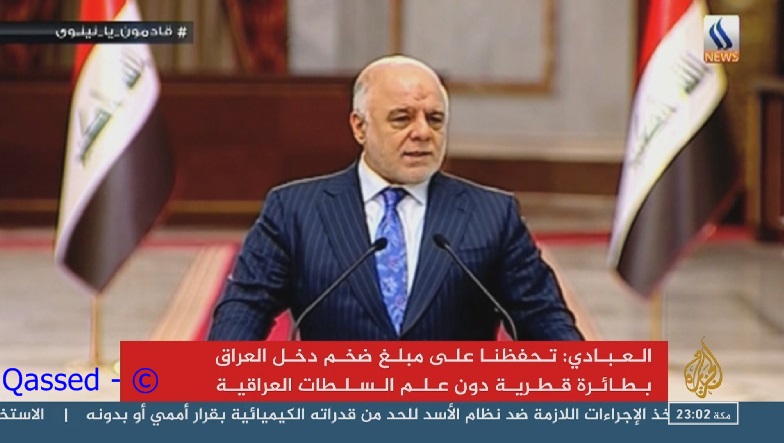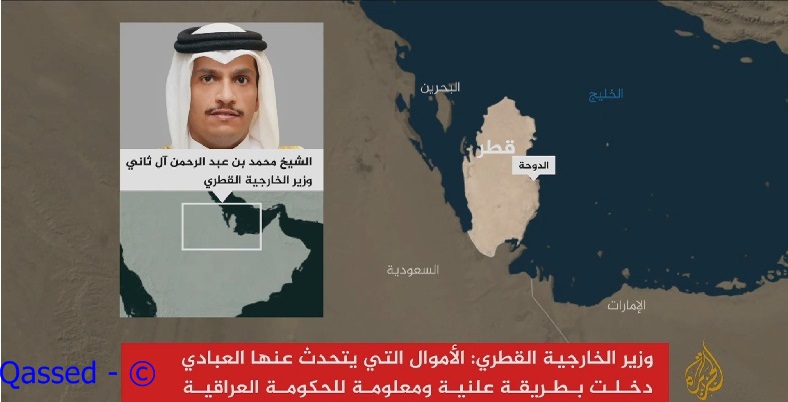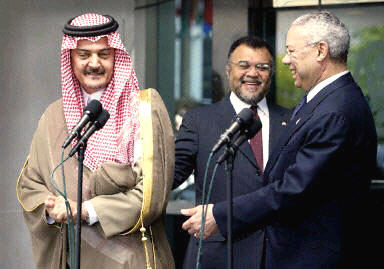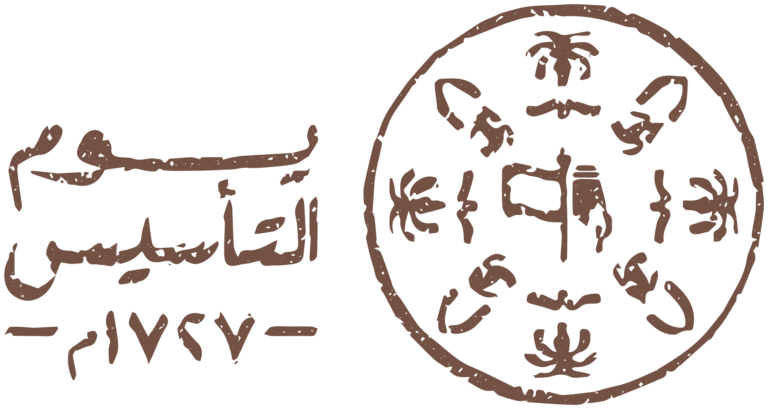المغرب لن يقطع علاقته مع قطر لأنه لا يريد التورط في المشاكل مع الأشقاء في الخليج بالرغم أن علاقتنا مع قطر لم تكن جيدة تاريخيا في عهد الملك الحسن الثاني وحمد السادس إلى مؤخرا
تثبيت التطبيق
How to install the app on iOS
Follow along with the video below to see how to install our site as a web app on your home screen.
ملاحظة: This feature may not be available in some browsers.
أنت تستخدم أحد المتصفحات القديمة. قد لا يتم عرض هذا الموقع أو المواقع الأخرى بشكل صحيح.
يجب عليك ترقية متصفحك أو استخدام أحد المتصفحات البديلة.
يجب عليك ترقية متصفحك أو استخدام أحد المتصفحات البديلة.
قطع العلاقات مع حكومة قطر " متابعة مستمرة "
- بادئ الموضوع Alucard
- تاريخ البدء
-
- الوسوم
- حمد قطر قطر الامارات
- الحالة
- مغلق و غير مفتوح للمزيد من الردود.
ويقولون قطر تحارب الحوثيين ... دماء شهدانا في رقابكم يا حكومة قطر حسبي الله ونعم الوكيل في كل من خان مشاهدة المرفق 79793
رشوة قطرية لحشد الارهابي في العراق من اجل اطلاق سراح المخطوفين القطريين.
رئيس وزراء دولة العصابات يعرف كل شيء لكنه يستعبط -_-


مشعان الجبوري :
لدينا 10 آلاف مقاتل مستعدين للقتال دفاعا عن قطر ضد السعودية !!
للعلم الشرقاط مسقط راس مشعان الجبوري بيد داعش لحد الان
اكتملت الحلقة المفقودة وليتها لم تكن قطر
نسعى منذ عشرات السنين لتحييد جبهه المماتعه ونستغرب ان تقدمنا في تحييدهم يذهب سدى
ولكن عرفنا الان الحلقه المفقودة والكود الذي يفرمل دعسنا لجبهة المماتعه
شكرا لك يابو فهد انك لم تتساهل مع هذا النتوء
دماء شهدائنا من الامن والجيش السعودي الذين قتلوا على يد القاعده والاخونجيه والحوثيين في رقبة قطر
لن نبايحكم مهما كلف الامر
اخي..
القرارات اصلاً لم تبدأ ..
كيف بدأت قطر تستورد من ايران..
والسؤال الخطير ذو الدلالة .. متى وقعت هذه الاتفاقيات اذا كانت القرارت لم تعلن الا قبل 24 ساعة ولم تبدأ اصلاً..!!
هذا كذب بواح ..
او دليل صحة الاتفاقيات بينهم قبل القرارات ..
وصحة ارتباطهم بخلايا التجسس الايرانية وترابطها مع خلايا التجسس القطرية في مكتب الرئيس اليمني هادي..والتعاون بينهم لضرب السعودية..!!
الامور ليست مراهقة ..
لكننا بلينا بالاجيال المؤدلجة وقطيع بلا عقل ولا فكر ..
يعتقد السياسة وادارة الدول والحكم ..مثل جلسته بالاستراحة والاستماع لقناة الجزيرة والخطابات الشعبوية..!!
الله يصلح حال الامة...
لكن اخوي لو تشوف الشعب القطري الان في مواقع التواصل وغيره , راح تشوف انهم فعلاً ضدنا و يضنون انهم مستهدفين من قبلنا مثل ما قلت و اننا مثل الخونة نريد احتلالهم
لن يسمح لهم باذن الله... هناك رجال تعلم ما تفعلخلاصة الاحداث
الشرق الاوسط سينقسم لعدة معسكرات
القوى العالمية ستنقسم اكثر واكثر
قسم يتبع امريكا
قسم اوروبا
قسم لروسيا
=====
اتوقع والله اعلم قطر ستخرج من منظومة مجلس التعاون سواء برغبتها او بالطرد ..
لذلك مستقبل المنطقة ذاهب الى المجهول
واضح بان هناك لاعبين من اوروبا وروسيا سيستغلون هذه الازمة وقد يتواجدون في قطر
ازمة ليست سهله جدا والله المستعان
الأردن يقرر خفض مستوى التمثيل الدبلوماسي مع قطر ويسحب ترخيص قناة "الجزيرة"
قبل قليل

هذا الرجل مصادره خطيره جدا
لكن ما مناسبة الصوره ؟؟؟
كلما تذكرت بندر بن سلطان
اتذكر سعود الفيصل رحمه الله و اسكنه فسيح جناته
ثنائي السياسة الجبار

خلونا نختبر الجزائر بعد تصريحهم انهم لم ولن يسمحوا باستهداف بلاد الحرمينخدها من عندي, ادا كانت قطر مع ايران فالجزائر ستكون مع قطر وفي صفها
أتوقع تدخل عسكري سعودي ... خصوصا أنه هناك مسؤول قطري حين سُئل عن الوضع العسكري قال "أنهم أُخبروا بعدم تدخل الأمريكان لو اتجهت الأزمة نحو العمل العسكري"
وهذا يعني أن هناك تقديرات بين السياسيين النافذين في الدولتين عن عمل عسكري ... زيارة الجبير لفرنسا وألمانيا وأوروبا لا تستدعيها مقاطعة شركات قطرية أو غيره ..
لأن المقاطعة الاقتصادية العربية فعلا كافية، لكن يبدو أنه أطلعهم على الخيارات المطروحة على الطاولة ... ومنها "العمل العسكري"
وهذا يعني أن هناك تقديرات بين السياسيين النافذين في الدولتين عن عمل عسكري ... زيارة الجبير لفرنسا وألمانيا وأوروبا لا تستدعيها مقاطعة شركات قطرية أو غيره ..
لأن المقاطعة الاقتصادية العربية فعلا كافية، لكن يبدو أنه أطلعهم على الخيارات المطروحة على الطاولة ... ومنها "العمل العسكري"
رشوة قطرية لحشد الارهابي في العراق من اجل اطلاق سراح المخطوفين القطريين.
رئيس وزراء دولة العصابات يعرف كل شيء لكنه يستعبط -_-


لا لا يستعبط المال اتجه الى جيبة مسؤوليي الحرس الثوري مباشره, و للعلم هذا التمويل الغير مباشر للحشد الشعبي و القاعده في سوريا هو "القشه التي قسمت ظهر البعير مع قطر".
https://www.ft.com/content/dd033082-49e9-11e7-a3f4-c742b9791d43
من الفايناشل تيمز
"Qatar paid up to $1bn to release members of the Gulf state’s royal family who were kidnapped in Iraq while on a hunting trip, according to people involved in the hostage deal — one of the triggers behind Gulf states’ dramatic decision to cut ties with Doha. Commanders of militant groups and government officials in the region told the Financial Times that Doha spent the money in a transaction that secured the release of 26 members of a Qatari falconry party in southern Iraq and about 50 militants captured by jihadis in Syria. By their telling, Qatar paid off two of the most frequently blacklisted forces of the Middle East in one fell swoop: an al-Qaeda affiliate fighting in Syria and Iranian security officials. The deal, which was concluded in April, heightened concerns among Qatar’s neighbours about the small gas-rich state’s role in a region plagued by conflict and bitter rivalries. And on Monday, Saudi Arabia, Egypt, the United Arab Emirates and Bahrain took the extraordinary step of cutting off diplomatic ties and transport links to Qatar, alleging the country fuels extremism and terrorism. “The ransom payments are the straw that broke the camel’s back,” said one Gulf observer. Doha denies it backs terrorist groups and dismissed the blockade by its neighbours as “founded on allegations that have no basis in fact”. It said it could not immediately respond to a request for comment on the hostage deal. But a person close to the Qatari government acknowledged that “payments” were made. The person was unaware of the amounts or where the money went.
Qatar, a US ally that hosts an American military base, has long drawn the ire of its neighbours, who consider Doha an irritating regional maverick. The world’s top exporter of liquefied natural gas, it has used its immense wealth to court relations from London to Washington and Tokyo. But critics accuse it of seeking to punch above its weight diplomatically, meddling in regional affairs and using the Arabic channel of Al Jazeera, the satellite television network it set up, as a propaganda tool. Doha has a history of reaching out to all kinds of controversial groups, from rebels in Sudan’s Darfur region to the Taliban in Afghanistan and Hamas in Gaza. Qatar touts itself as a neutral player that can act as an intermediary in regional conflicts. But its critics, notably Saudi Arabia and the UAE, allege it also uses such interventions to play both sides and fund radical Islamist groups, most recently in Libya and Syria. And to Doha’s critics, the hostage deal was further evidence of that role. Related article What is behind the extraordinary Gulf dispute with Qatar? Doha’s alleged support for terrorism pits vital US allies in Middle East against each other “If you want to know how Qatar funds jihadis, look no further than the hostage deal,” said a Syrian opposition figure who has worked with an al-Qaeda mediator on hostage swaps in Syria. “And this isn’t the first — it is one of a series since the beginning of the war.” The Financial Times spoke to people involved on both sides of the hostage swap deal, including two government officials in the region, three Iraqi Shia militia leaders and two Syrian opposition figures. Around $700m was paid both to Iranian figures and the regional Shia militias they support, according to regional government officials. They added that $200m to $300m went to Islamist groups in Syria, most of that to Tahrir al-Sham, a group with links to al-Qaeda. Those who spoke to the FT said the deal highlighted how Qatar has allegedly used hostage payments to bankroll jihadis in Syria. But to its Gulf neighbours, the biggest issue is likely to be the fact that Doha could have paid off their main regional rival, Iran, which they accuse of fuelling conflicts in the Arab world. This particular saga began when an Iranian-backed Iraqi Shia militia, known as Kata’eb Hizbollah, kidnapped the Qataris in December 2015. Three Iraqi militia leaders say the hostages were held in Iran. Kata’eb Hizbollah is an Iraqi group but it is seen as having links with Iran’s main regional proxy, Hizbollah, the Lebanese militant group. The latter is helping Iran back Bashar al-Assad, the Syrian president, in his country’s six-year conflict. Two regional diplomats said they believed one of the Iraqi group’s motives for the kidnapping was to give Hizbollah and Iran leverage to negotiate the release of Shia fighters kidnapped by the radical Sunni group Tahrir al-Sham in Syria. Tahrir al-Sham, in previous iterations, was an al-Qaeda branch. It claims it has broken the connection, but the international community still views it as an affiliate."
في هذه الحالة على مصر ان تعمل لها دور في كسب الجزئرخدها من عندي, ادا كانت قطر مع ايران فالجزائر ستكون مع قطر وفي صفها
ماهي هاته الشروط, وهل في استطاعة قطر ان تستجيب لها?
ان شاء الله تستجيب حتى لايحدث مالا نتمناه لها
اتوقع بتستجيب لجزء من الشروط والاخر ليس بيدها لانه بيد عزمي بشاره
انواكشوط, 06/06/2017 - أعلنت موريتانيا قطع علاقاتها الدبلوماسية مع دولة قطر، في ظل إصرار هذه الدولة على التمادي في السياسات التي تنتهجها.
جاء ذلك في بيان صادر عن وزارة الشؤون الخارجية والتعاون اليوم تلقت الوكالة الموريتانية للأنباء نسخة منه.
وهذا نص البيان
أكدت الجمهورية الإسلامية الموريتانية في كل المناسبات التزامها القوي بالدفاع عن المصالح العربية العليا، وتمسكها الثابت بمبدأ احترام سيادة الدول، وعدم التدخل في شؤونها، وسعيها الدؤوب لتوطيد الأمن والاستقرار في وطننا العربي والعالم. وقد عكست مواقفها دوما قناعتها الراسخة بضرورة تعزيز التعاون والتضامن بين الأشقاء، والتصدي لكل ما من شأنه تهديد الأمن والاستقرار في وطننا العربي.
لكن، وللأسف الشديد، دأبت دولة قطر على العمل على تقويض هذه المبادئ التي تأسس عليها العمل العربي المشترك.فقد ارتبطت سياستها في المنطقة بدعم التنظيمات الإرهابية، وترويج الأفكار المتطرفة. وعملت على نشر الفوضى والقلاقل في العديد من البلدان العربية، مما نتج عنه مآسي إنسانية كبيرة في تلك البلدان وفي أوروبا وعبر العالم؛ كما أدى إلى تفكيك مؤسسات دول شقيقة وتدمير بناها التحتية.
وفي ظل إصرار دولة قطر على التمادي في هذه السياسات التي تنتهجها، قررت حكومة الجمهورية الإسلامية الموريتانية قطع علاقاتها الدبلوماسية مع دولة قطر.
http://www.ami.mr/Depeche-49187.html
جاء ذلك في بيان صادر عن وزارة الشؤون الخارجية والتعاون اليوم تلقت الوكالة الموريتانية للأنباء نسخة منه.
وهذا نص البيان
أكدت الجمهورية الإسلامية الموريتانية في كل المناسبات التزامها القوي بالدفاع عن المصالح العربية العليا، وتمسكها الثابت بمبدأ احترام سيادة الدول، وعدم التدخل في شؤونها، وسعيها الدؤوب لتوطيد الأمن والاستقرار في وطننا العربي والعالم. وقد عكست مواقفها دوما قناعتها الراسخة بضرورة تعزيز التعاون والتضامن بين الأشقاء، والتصدي لكل ما من شأنه تهديد الأمن والاستقرار في وطننا العربي.
لكن، وللأسف الشديد، دأبت دولة قطر على العمل على تقويض هذه المبادئ التي تأسس عليها العمل العربي المشترك.فقد ارتبطت سياستها في المنطقة بدعم التنظيمات الإرهابية، وترويج الأفكار المتطرفة. وعملت على نشر الفوضى والقلاقل في العديد من البلدان العربية، مما نتج عنه مآسي إنسانية كبيرة في تلك البلدان وفي أوروبا وعبر العالم؛ كما أدى إلى تفكيك مؤسسات دول شقيقة وتدمير بناها التحتية.
وفي ظل إصرار دولة قطر على التمادي في هذه السياسات التي تنتهجها، قررت حكومة الجمهورية الإسلامية الموريتانية قطع علاقاتها الدبلوماسية مع دولة قطر.
http://www.ami.mr/Depeche-49187.html
عضو الكنيست الصهيوني عزمي بشارة يجر المنطقة فوق صفيح ساخن.
انقلاب او تنازل من تميم للعودة للحضن الخليجي.
المفروض يتنازل لواحد من ابناء عمه او لأحد اعمامه مادام في أدلة تثبت طورتهم في ضرب الأمن القومي لدول عربيه
- الحالة
- مغلق و غير مفتوح للمزيد من الردود.
المواضيع المشابهة
- الردود
- 21
- المشاهدات
- 1K
- الردود
- 2
- المشاهدات
- 901
- الردود
- 1
- المشاهدات
- 361
- مغلق
- الردود
- 89
- المشاهدات
- 7K
- الردود
- 1
- المشاهدات
- 951


